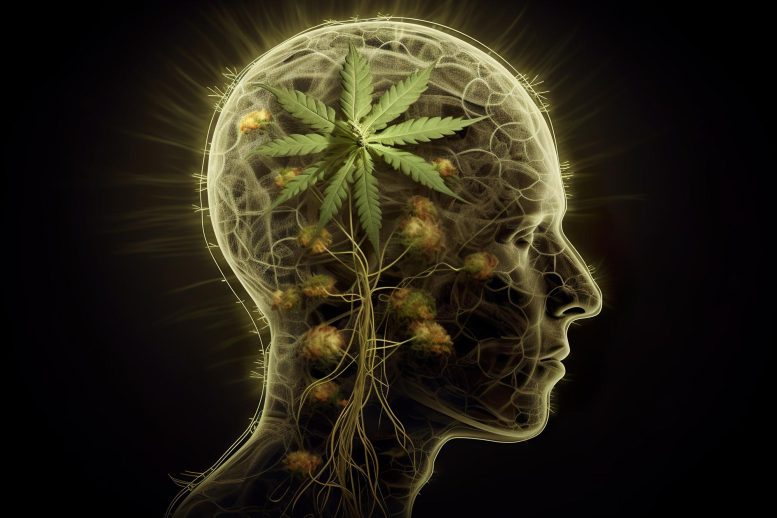
A Danish study involving over six million participants found that cannabis use disorder significantly increases the risk of developing depression and bipolar disorder. Despite the link, researchers stress that the study doesn’t conclusively prove that cannabis use causes these mental health conditions, advising caution in use and consideration in legalization debates.
A new study suggests that cannabis use disorder leads to an increased risk of developing bipolar disorder and depression.
Cannabis is one of the world’s most commonly used illegal drugs. New Danish research suggests that cannabis use disorder is more strongly linked with the development of mental disorders than previously assumed.
The study includes register data from more than six million Danes and its findings indicate that cannabis use disorder increases the risk of both psychotic and non-psychotic depression and bipolar disorder.
“When we take differences in gender, age, socioeconomics, and family history, and more into account, we see that cannabis use disorder is associated with almost twice the risk of developing depression and a two-to-three-times higher risk of developing bipolar disorder in both men and women,” says Oskar Hougaard Jefsen, a PhD student from the Department of Clinical Medicine at Aarhus University. He is the lead author of the study, which has just been published in the scientific journal JAMA Psychiatry.

“As far as we know, we’ve conducted the world’s largest study of the link between cannabis use disorder and affective disorders,” says Oskar Hougaard Jefsen, a PhD student from the Department of Clinical Medicine at Aarhus University. He is the first author of the study, which includes register data from more than six million Danes. Credit: Simon Byrial Fischel
According to the Danish Health Authority, one in three Danes under the age of 25 has smoked cannabis. However, the new study only focuses on people with a significant consumption of cannabis such that they have been registered with a substance use disorder – e.g. because they have been in contact with the substance abuse treatment system or other parts of the healthcare system.
More countries are legalizing cannabis
Several studies have supported the hypothesis that extensive cannabis use is not harmless to human mental health. For example, previous studies suggest that cannabis use disorder can increase the risk of developing schizophrenia. But until now, the risk of other mental disorders has been sparsely studied.
In this study, researchers from Aarhus University and the University of Copenhagen have analyzed data from Danish nationwide registers such as the National Patient Register, the Danish Psychiatric Central Research Register, and the Danish Register of Pharmaceutical Sales.
“The study is the largest of its kind in the world, and our findings suggest that cannabis use disorder is also associated with an increased risk of developing depression and bipolar disorder. The results recommend caution when it comes to using cannabis. This applies to people with an increased risk of developing mental illness, and to politicians and other decision-makers who are discussing the possibilities of legalizing cannabis,” says Oskar Hougaard Jefsen.
An increasing number of countries are legalizing the production and sale of cannabis for medicinal and recreational use. Since 2018, general practitioners in Denmark have been able to write prescriptions for drugs based on cannabis for patients as part of a trial scheme that also gives companies and individuals the opportunity to produce cannabis for medicinal or industrial use.
Oskar Hougaard Jefsen believes that the results of the study should be considered when it comes to legalizing and controlling cannabis use.
“We should conduct more research into whether there are people for whom cannabis is particularly harmful. This could strengthen preventative measures,” he says, adding that there is a particular need for more knowledge about the dose-dependent effects of cannabis use on the brain, cognition, and behavior, and for identifying risk factors for the transition from cannabis use disorder to psychiatric disorders.
No conclusive evidence
Oskar Hougaard Jefsen points out that, despite the indications in the study, it does not provide conclusive evidence that cannabis causes these mental disorders.
For example, he cannot rule out that undiagnosed depression or bipolar disorder has led some of the people in the register-based study to develop cannabis use disorder – i.e. the disease resulted in the abuse and not the other way around.
“But when we see an increased disease risk – even ten years after the cannabis use disorder has been registered – I don’t think that self-medication can be the only explanation. It seems unlikely that so many people would go undiagnosed for so long,” he says.
“Danish register data really gives us a unique opportunity to take into account many of the crucial factors that could affect the results. However, conclusive evidence would require a randomized controlled trial in which a group of people would have to smoke large amounts of cannabis to see if this increased their risk of developing mental illness in the long term, and such a study would, of course, be unethical,” he says.
The research results – more information
- The study is a register-based epidemiological cohort study of 6,651,765 people born in Denmark before 2006, and who lived in Denmark between 1995 and 2021. An equal number of men and women appear in the study.
- The partners are Associate Professor Carsten Hjorthøj, Senior Researcher Annette Erlangsen and Clinical Professor Merete Nordentoft – all three from the University of Copenhagen.
Reference: “Cannabis Use Disorder and Subsequent Risk of Psychotic and Nonpsychotic Unipolar Depression and Bipolar Disorder” by Oskar Hougaard Jefsen, MD; Annette Erlangsen, PhD; Merete Nordentoft, DMSc and Carsten Hjorthøj, PhD, 24 May 2023, JAMA Psychiatry.
DOI: 10.1001/jamapsychiatry.2023.1256









I was excited to read this article, until I noticed “Cannabis Use Disorder” keep appearing. I need to learn to be more cynical. Approaching cannabis use as a personality disorder isn’t going to get reliable results. You can correlate it to bipolar and depression disorders, but you can correlate wearing hats to that, or reading biased studies. Indeed the study doesn’t even follow the DSM-V in diagnosis via its eleven criterion, but simply correlating “Cannabis use” of any sort. Why they keep sabotaging impartiality with the unreasonable assumption, I don’t know, but maybe it’s Study Performance Disorder.
The study is very short, unless the full text is unavailable. From what I can tell, only 8 of the 28 years of data even had “cannabis use disorder” available as a diagnosis since the DSM-V. For cannabis use to have been in the register, it would have needed to be medically diagnosed and recorded, so you’re already dealing with a clinicalized sample pool more likely to be diagnosed with general illness. The hazard ratios are not impressive for such low-probability hazards like psychosis. It’s a simple correlation, which isn’t helpful when many consider (and other studies show) cannabis to be an effective treatment for mild depression and bipolar-like symptoms.
The population under study comprised people who had already had contact with the Danish mental-health system, i.e., people who had already demonstrated psychological problems. Please study a mentally “healthy” population and get back to us.
Yet another over-hyped study on cannabis: even researcher Jefsen concedes that the study offers no conclusive evidence that cannabis causes the mental disorders cited in the headline.
Unfortunately, the study is pay-walled, and this article is mum on the subject of funding, an important factor when considering the researchers’ potential biases.
I’m a 64 year old male that has been smoking marijuana since 15 years old. No cancer disabled Veteran who has smoked the best in the world in Amsterdam lately 70s. I’m not going to kill myself or anything else. Make a study for the healthy cannabis smokers. Siblings don’t smoke and they have been thru cancer. What about the kid that God put on earth for man to use. The devil gave man knowledge Alcohol and it destroyed my life in the work force. Cannabis has gave me CBD. No more pills that destroyed my teeth. Big Pharma is your government it’s all about money
This is so frustrating to read. “Increased risk.” What IS the increased risk? What are the numbers?? Why do you print this clickbait that leaves out the numbers? The answer is obviou$.
The article simplified the numbers to “times more likely”, which is simpler but less precise. From the study, “Cannabis use disorder was associated with an increased risk of unipolar depression (HR, 1.84; 95% CI, 1.78-1.90), psychotic unipolar depression (HR, 1.97; 95% CI, 1.73-2.25), and nonpsychotic unipolar depression (HR, 1.83; 95% CI, 1.77-1.89). Cannabis use was associated with an increased risk of bipolar disorder in men (HR, 2.96; 95% CI, 2.73-3.21) and women (HR, 2.54; 95% CI, 2.31-2.80), psychotic bipolar disorder (HR, 4.05; 95% CI, 3.52-4.65), and nonpsychotic bipolar disorder in men (HR, 2.96; 95% CI, 2.73-3.21) and women (HR, 2.60; 95% CI, 2.36-2.85). Cannabis use disorder was associated with higher risk for psychotic than nonpsychotic subtypes of bipolar disorder (relative HR, 1.48; 95% CI, 1.21-1.81) but not unipolar depression (relative HR, 1.08; 95% CI, 0.92-1.27).”
HR is the hazard ratio, how strongly correlated the risk is, with a confidence interval of 95%. Basically, if the HR is less than 1 it’s less likely, if it’s more than 1 it’s more likely. I commented above with criticisms of this study; for example, if they had checked this specific treatment-seeking sample pool for people who wore hats instead of used cannabis, I believe they would have found similar correlation.